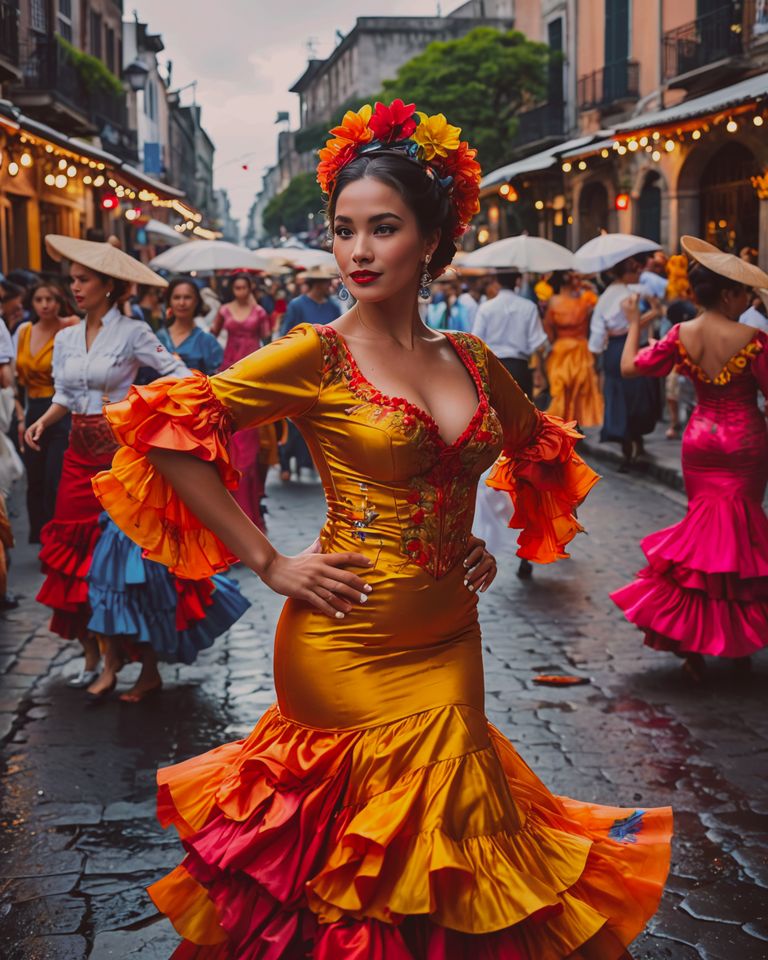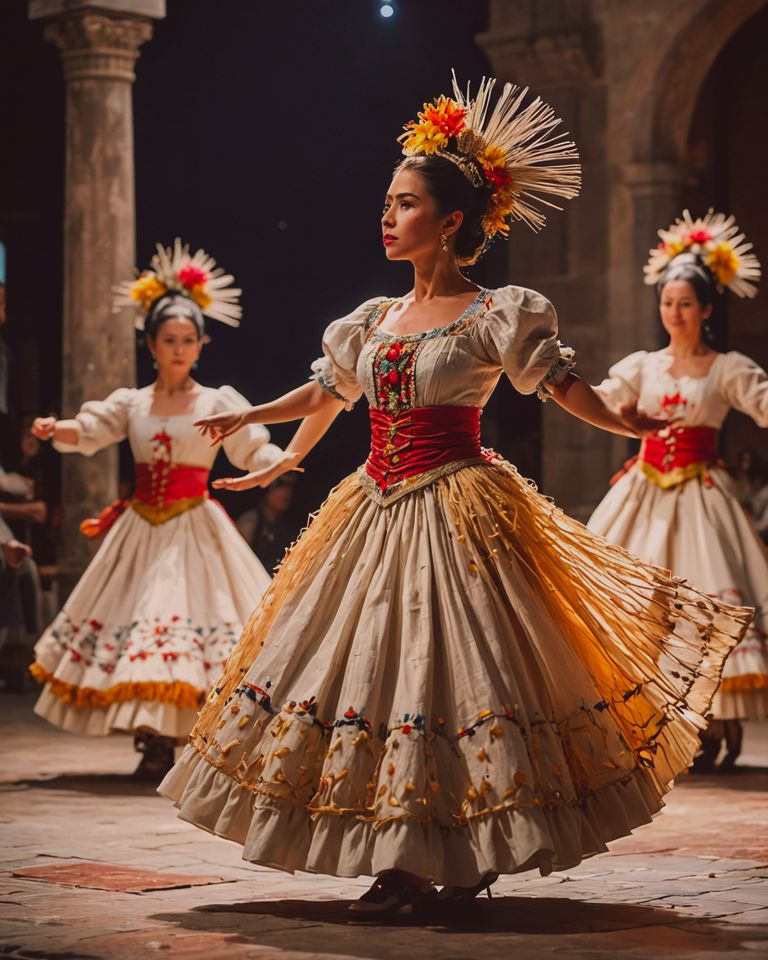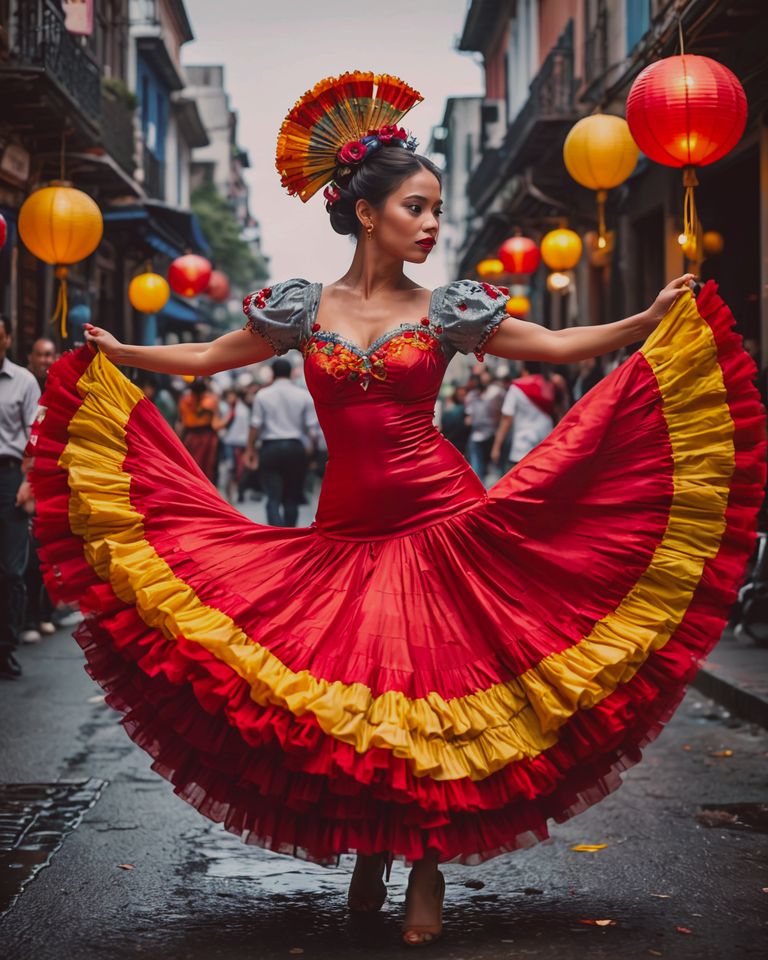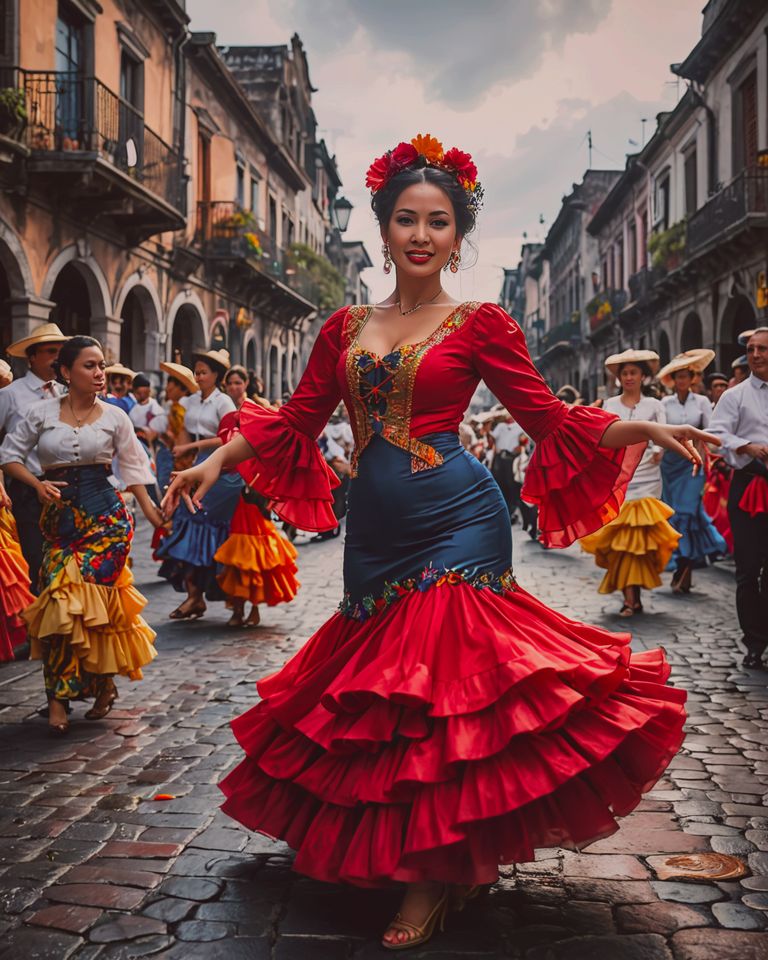
In a small coastal town in the Philippines, where the sound of the waves intertwined with the murmur of the wind, lived Elena, a nineteen-year-old girl with a deep passion for literature. Since she was a child, her grandmother used to tell her stories about the time when the Philippines was part of the vast Spanish empire. The narratives spoke of a time when Spanish was the language of government and culture, and where the Manila Galleon sailed between the coasts of his home and the distant lands of Spanish America.
Elena used to sit in her grandmother's rocking chair, listening intently while the old woman related how Spanish merchants brought with them not only goods, but also ideas and customs that were intertwined with local traditions. However, as she got older, Elena began to notice that Spanish had begun to fade in her community. American influence had imposed English as the dominant language, and many of his friends barely knew a few words in Spanish.
One day, while exploring the local library, Elena found an old book of poems written in Spanish. The words danced before her eyes, evoking images of distant landscapes and shared traditions. Determined to rediscover her heritage, she began researching more about the connection between the Philippines and Latin America.

Her search led her to meet José Dalisay, a renowned Filipino writer who had dedicated his life to preserving literature in Spanish. Elena felt nervous as she approached him to ask for an interview. In a cozy cafe in the center of Manila, they met for the first time.
"Mr. Dalisay,“ Elena began with a mixture of shyness and determination, "I have read about your work and how it has influenced Philippine literature. I would like to understand more about the role of Spanish in our culture.”
Dalisay smiled kindly. "Spanish has been an integral part of our cultural identity. Although my generation did not have the opportunity to learn it as we should, its influence is felt in our works and in our way of seeing the world.”
"Do you think we have lost something important by stopping using it?"Elena asked, looking to delve into her thoughts.
"Without a doubt," Dalisay replied, looking out the window as if searching for answers on the horizon. "Language is a vehicle for culture. When we stop using it, we also lose the stories and traditions that come with it. It's a painful loss.”
Elena nodded, feeling the weight of his words. “I want to do something about it," he said determinedly. “I want to revive the interest in Spanish among the young people of my town.”
“That is a noble cause," Dalisay said. "But remember that it's not just about the language; it's also about reconnecting with our cultural roots. I encourage you to go ahead with your project.”
With renewed energy, Elena decided to look for more information about the connection between the Philippines and Latin America. That was how she got to know Javier Galván, director of the Cervantes Institute in Manila. During their meeting at the institute's facilities, Elena raised her concerns with him.
"Señor Galván,“ she began, "I have been researching about how Spanish has influenced our culture and I would like to know more about your perspective.”
Galvan smiled and offered him a seat. "Of course, Elena. Spanish was the language of the government during the Spanish colonization and had a significant impact on our society. However, after the American occupation, its use declined rapidly.”
“Why do you think that happened?"Elena asked curiously.
“When the Americans arrived, they imposed English as the official language,” Galvan explained. "This led to a decrease in the use of Spanish in schools and in everyday life. But there is still a strong cultural bond with Hispanic America; many Filipinos feel that connection.”
“That's what I want to highlight," Elena said passionately. "I want to organize a literary festival to celebrate our Hispanic heritage and show how Spanish is still alive in our culture.”
Galvan nodded approvingly. “That's a wonderful idea. A festival can be a great way to attract young people and remind them of their roots.”
With the moral support of Dalisay and Galván, Elena dedicated herself to organizing the literary festival in her coastal town. He spent weeks planning every detail: he invited local writers and cultural experts to talk about the impact of Spanish in the Philippines and how Chabacano - a Creole language that had emerged from this cultural mix- was still alive on the streets.
The day of the festival finally arrived. The village was filled with vibrant colors, joyful music and infectious laughter as the inhabitants gathered to celebrate their shared heritage.

During the opening of the event, Elena took the microphone nervously but also with determination.
"Welcome everyone," she began in a clear voice. "Today we celebrate not only our shared history with Latin America but also our cultural legacy that endures despite time.”
Applause echoed as she continued: "Through Spanish and our Creole traditions like chabacano, we keep the stories of our ancestors alive.”
Throughout the day, participants attended writing workshops in Spanish and listened to old stories told by local storytellers. The atmosphere was filled with nostalgia and hope.
At the end of the festival, Elena watched as her neighbors exchanged ideas about what they learned during the event. He approached a group where some young people were animatedly discussing the literary works presented.
“What did you think of it?"Elena asked enthusiastically.
“It was amazing," said one of them named Marco. "I didn't know we had so much cultural wealth related to Latin America.”

"Yes," added another young woman named Ana. “I would like to learn more about Spanish; I feel that it is part of me.”
Elena's heart was filled with joy when she heard those words. He had accomplished more than just an event; he had ignited a spark of curiosity about the shared history between the Philippines and Hispanic America.
While the last rays of the sun illuminated the town at sunset, Elena sat by the sea reflecting on what happened that day. He had created a space where stories could be retold; where young people could reconnect with their roots.
The cultural connection would endure for future generations, reminding them that although time had changed the spoken language, the roots were still firm and vibrant beneath the surface.
The story was not lost; it was simply waiting to be rediscovered by those willing to listen to it and share it again. With a satisfied smile, Elena felt that she had started a new chapter not only for herself but for her entire community.
Source of the images
Image created with Starryai.
Versión en Español
En un pequeño pueblo costero de Filipinas, donde el sonido de las olas se entrelazaba con el murmullo del viento, vivía Elena, una joven de diecinueve años con una profunda pasión por la literatura. Desde que era niña, su abuela le contaba historias sobre la época en que Filipinas era parte del vasto imperio español. Las narraciones hablaban de un tiempo en el que el español era el idioma del gobierno y la cultura, y donde el Galeón de Manila navegaba entre las costas de su hogar y las tierras lejanas de Hispanoamérica.
Elena solía sentarse en la mecedora de su abuela, escuchando atentamente mientras la anciana relataba cómo los comerciantes españoles traían consigo no solo bienes, sino también ideas y costumbres que se entrelazaron con las tradiciones locales. Sin embargo, a medida que crecía, Elena comenzó a notar que el español había comenzado a desvanecerse en su comunidad. La influencia estadounidense había impuesto el inglés como lengua dominante, y muchos de sus amigos apenas conocían algunas palabras en español.
Un día, mientras exploraba la biblioteca local, Elena encontró un viejo libro de poemas escritos en español. Las palabras danzaban ante sus ojos, evocando imágenes de paisajes lejanos y tradiciones compartidas. Decidida a redescubrir su herencia, comenzó a investigar más sobre la conexión entre Filipinas e Hispanoamérica.
Su búsqueda la llevó a conocer a José Dalisay, un reconocido escritor filipino que había dedicado su vida a preservar la literatura en español. Elena se sintió nerviosa al acercarse a él para pedirle una entrevista. En un café acogedor del centro de Manila, se encontraron por primera vez.
“Señor Dalisay,” comenzó Elena con una mezcla de timidez y determinación, “he leído sobre su trabajo y cómo ha influido en la literatura filipina. Me gustaría entender más sobre el papel del español en nuestra cultura.”
Dalisay sonrió amablemente. “El español ha sido una parte integral de nuestra identidad cultural. A pesar de que mi generación no tuvo la oportunidad de aprenderlo como debíamos, su influencia se siente en nuestras obras y en nuestra forma de ver el mundo.”
“¿Cree que hemos perdido algo importante al dejar de usarlo?” preguntó Elena, buscando profundizar en sus pensamientos.
“Sin duda,” respondió Dalisay, mirando por la ventana como si buscara respuestas en el horizonte. “El idioma es un vehículo para la cultura. Cuando dejamos de usarlo, perdemos también las historias y tradiciones que vienen con él. Es una pérdida dolorosa.”
Elena asintió, sintiendo el peso de sus palabras. “Quiero hacer algo al respecto,” dijo con determinación. “Quiero revivir el interés por el español entre los jóvenes de mi pueblo.”
“Esa es una noble causa,” afirmó Dalisay. “Pero recuerda que no solo se trata del idioma; es también sobre reconectar con nuestras raíces culturales. Te animo a que sigas adelante con tu proyecto.”
Con renovada energía, Elena decidió buscar más información sobre la conexión entre Filipinas e Hispanoamérica. Así fue como llegó a conocer a Javier Galván, director del Instituto Cervantes en Manila. Durante su encuentro en las instalaciones del instituto, Elena le planteó sus inquietudes.
“Señor Galván,” comenzó ella, “he estado investigando sobre cómo el español ha influido en nuestra cultura y me gustaría saber más sobre su perspectiva.”
Galván sonrió y le ofreció un asiento. “Claro, Elena. El español fue el idioma del gobierno durante la colonización española y tuvo un impacto significativo en nuestra sociedad. Sin embargo, tras la ocupación estadounidense, su uso decayó rápidamente.”
“¿Por qué cree que eso sucedió?” preguntó Elena con curiosidad.
“Cuando los estadounidenses llegaron, impusieron el inglés como lengua oficial,” explicó Galván. “Esto llevó a una disminución del uso del español en las escuelas y en la vida cotidiana. Pero aún hay un vínculo cultural fuerte con Hispanoamérica; muchos filipinos sienten esa conexión.”
“Eso es lo que quiero resaltar,” dijo Elena apasionadamente. “Quiero organizar un festival literario para celebrar nuestra herencia hispánica y mostrar cómo el español sigue vivo en nuestra cultura.”
Galván asintió con aprobación. “Esa es una idea maravillosa. Un festival puede ser una excelente manera de atraer a los jóvenes y recordarles sus raíces.”
Con el apoyo moral de Dalisay y Galván, Elena se dedicó a organizar el festival literario en su pueblo costero. Pasó semanas planeando cada detalle: invitó a escritores locales y expertos en cultura para hablar sobre el impacto del español en Filipinas y cómo el chabacano —un idioma criollo que había surgido de esta mezcla cultural— seguía vivo en las calles.
Finalmente llegó el día del festival. El pueblo se llenó de colores vibrantes, música alegre y risas contagiosas mientras los habitantes se reunían para celebrar su herencia compartida.
Durante la inauguración del evento, Elena tomó el micrófono con nerviosismo pero también con determinación.
“Bienvenidos todos,” comenzó ella con voz clara. “Hoy celebramos no solo nuestra historia compartida con Hispanoamérica sino también nuestro legado cultural que perdura a pesar del tiempo.”
Los aplausos resonaron mientras ella continuaba: “A través del español y nuestras tradiciones criollas como el chabacano, mantenemos vivas las historias de nuestros antepasados.”
A lo largo del día, los participantes asistieron a talleres de escritura en español y escucharon relatos antiguos contados por narradores locales. La atmósfera estaba impregnada de nostalgia y esperanza.
Al final del festival, Elena observó cómo sus vecinos intercambiaban ideas sobre lo aprendido durante el evento. Se acercó a un grupo donde algunos jóvenes discutían animadamente sobre las obras literarias presentadas.
“¿Qué les pareció?” preguntó Elena con entusiasmo.
“Fue increíble,” dijo uno de ellos llamado Marco. “No sabía que teníamos tanta riqueza cultural relacionada con Hispanoamérica.”
“Sí,” agregó otra joven llamada Ana. “Me gustaría aprender más sobre el español; siento que es parte de mí.”
El corazón de Elena se llenó de alegría al escuchar esas palabras. Había logrado algo más que un simple evento; había encendido una chispa de curiosidad por la historia compartida entre Filipinas e Hispanoamérica.
Mientras los últimos rayos del sol iluminaban el pueblo al atardecer, Elena se sentó junto al mar reflexionando sobre lo acontecido ese día. Había creado un espacio donde las historias podían ser contadas nuevamente; donde los jóvenes podían reconectar con sus raíces.
La conexión cultural perduraría en las generaciones futuras, recordándoles que aunque el tiempo había cambiado el idioma hablado, las raíces seguían firmes y vibrantes bajo la superficie.
La historia no estaba perdida; simplemente esperaba ser redescubierta por aquellos dispuestos a escucharla y compartirla nuevamente. Con una sonrisa satisfecha, Elena sintió que había comenzado un nuevo capítulo no solo para ella misma sino para toda su comunidad.
Fuente de las imágenes
Imagen creada con Starryai.
¡Queremos leerte!
Entra y publica tus artículos con nosotros.
Vota por el witness @cosmicboy123